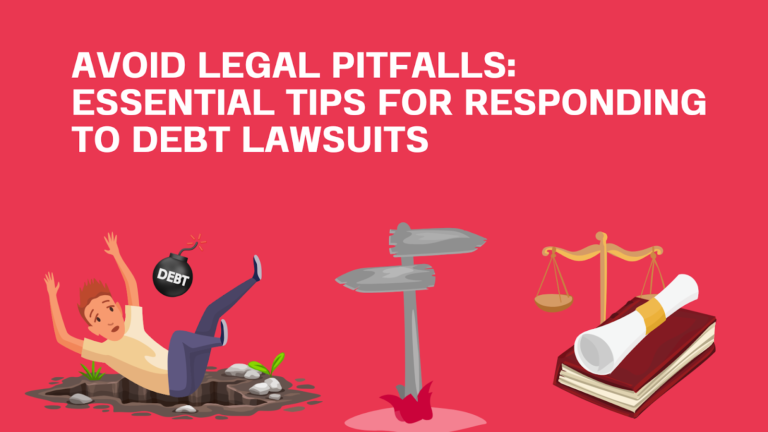Are you facing a debt lawsuit and worried about the potential legal missteps? Responding to a debt lawsuit can feel overwhelming, especially when the stakes are high. Every decision counts, and an error could cost more than just money; it could destroy your credit score, compromise your assets, and shatter your peace of mind. Worry no more; with the right support, you can understand and traverse these legal waters well and respond accordingly.
This blog provides essential tips to avoid common legal pitfalls, protect your rights, and take control of your financial future. Let’s dive in to make a real difference in your response.
Why It’s Essential to Avoid Legal Pitfalls in Debt Lawsuits?
Mistakes in debt lawsuits can bring serious financial consequences. Here’s why it’s important to avoid legal pitfalls in these regions:
- California, United States: The 30-day California response rule requires fast and correct action. Otherwise, it may result in wage garnishments or even bank levies. Familiarize yourself with the particular laws in the state, such as the Rosenthal Fair Debt Collection Practices Act.
- United Kingdom: UK debt laws are strict with severe penalties for missing deadlines or incorrect responses. Stay updated on the timeline and requirements to avoid quick judgment and extra penalties.
- Ontario, Canada: Cases in Ontario need to be processed within the shortest period to prevent default judgments. Penalties may range from wage garnishments, to account freezes, and understanding debtor rights and rules becomes important in Ontario.
Before exploring strategies for responding to a debt lawsuit, familiarize yourself with the law landscape in each region, since the laws regarding debt collection are quite strict. Understanding how to respond to a summons in California and similar places can prevent aggressive collection action and save your assets. Whether in California, the UK, or Ontario, being aware can arm you with the necessary steps to fortify your defense.
I. Understanding Your Rights When Faced with a Debt Lawsuit
Understanding your rights is important in defending against a debt lawsuit. Federal and state laws protect you against some unfair debt collection practices. The Fair Debt Collection Practices Act prevents a debt collector from using harassment, false statements, or other improper methods. If a debt collector violates this law, you may have grounds to sue.
Over 70% of consumers reported harassment, so if you feel mistreated, then you may have a valid case. Always confirm if the debt is due before responding to a lawsuit. According to the Consumer Financial Protection Bureau, 53% of those sued do not even owe the debt. So, double-checking the debt’s details can save you from unnecessary payments.
II. Initial Steps to Take After Receiving a Summons
Getting a summons may feel overwhelming, but it’s not the end it’s the start of an important process that requires quick action.
- Read the Lawsuit Papers Carefully: A summons contains important information about the debt, such as the amount owed, who is suing you, and key court dates. Be prepared with documents related to the debt and respond to them.
- Don’t Ignore the Summons: Ignoring it can lead to a default judgment, where the court sides with the creditor. It may result in wage garnishment or account seizures. Prompt response would keep you from these punishments.
- Seek Legal Aid Options: Look for a lawyer or low-cost legal aid services. Many organizations help with debt cases, and even a short consultation can help you understand your options and prepare your response.
III. Preparing and Filing a Strong Response
The response you give is the most important to your case. Here’s how to prepare for it:
- Start by drafting a clear, accurate answer. Deny all claims you believe are false and admit to those that are valid. Make your response simple and factual, without elaborating on details that may weaken your case.
- Next, use the correct legal language and format. Most courts expect a response in the right format, using proper terms of law and court rules means that you’re serious and understand the whole process.
- Finally, request documentation and proof. Seek the original document from the creditor, like the debt contract to prove the allegations. Many cases get dismissed since creditors cannot present valid proof.
IV. Negotiating with Creditors: Alternative Approaches
Negotiation can be very effective if you are looking to resolve a debt lawsuit without appearing in trial.
- Evaluate Settlement and Payment Options: If possible, bargain for your settlement options. Discuss decreasing the debt amount or extending payment terms. Set a good tone for constructive negotiation.
- Consider Debt Validation and Resolution Programs: Programs that validate debt legitimacy can give you leverage in your case. Moreover, professional debt resolution programs may provide structured options for the payment process.
- Weigh the Benefits of Hiring a Debt Attorney: Although legal representation is expensive, an attorney may be able to negotiate better terms or even have the case dismissed if there are grounds. Many states offer free legal assistance to those who cannot afford an attorney for debt cases.
V. Common Legal Pitfalls to Avoid in Debt Lawsuit Responses
Mistakes in responding to debt lawsuits can be costly. Below are some of the most common pitfalls and how to avoid them.
| Common Mistakes | How to Avoid Them |
| Admitting Liability | Avoid statements that could be seen as admitting fault because this can weaken your position and lead to higher judgments. |
| Ignoring the Statute of Limitations | Check if the debt is beyond the legal time limit. Making small payments or promises can restart the timeline and make you liable again. |
| Making Quick, Emotional Decisions | Don’t rush. Avoid partial payments or quick responses without a plan, as these can reset timelines and complicate your case. |
Conclusion
Navigating a debt lawsuit is challenging, but with the right steps, you can protect yourself and work toward a favorable resolution. Understanding one’s rights, proper response structure, and negotiation where applicable are all essential to avoid costly legal mistakes. Take control of your financial future: respond thoughtfully, and empower yourself in the process of the law.
Take action today! If you’re ready to protect yourself, start understanding your rights and build a plan for your response.
FAQs
- What happens if I ignore a debt lawsuit summons?
Ignoring a summons can lead to a default judgment permitting the creditor to garnish your wages, seize assets, or levy accounts. You need to hire an attorney immediately upon being served.
- Can I settle the debt outside of court, and how?
Yes, settlement can become much smaller or even payable through a fair payment plan when communicating with the creditors. Reach out to the creditor and propose an amount for settling.
- Do I need a lawyer to respond to a debt lawsuit?
While a lawyer isn’t mandatory, legal representation can provide strategic advantages. If hiring a lawyer is financially unfeasible, consider seeking help from legal aid organizations.

Daniel J. Morgan is the founder of Invidiata Magazine, a premier publication showcasing luxury living, arts, and culture. With a passion for excellence, Daniel has established the magazine as a beacon of sophistication and refinement, captivating discerning audiences worldwide.





